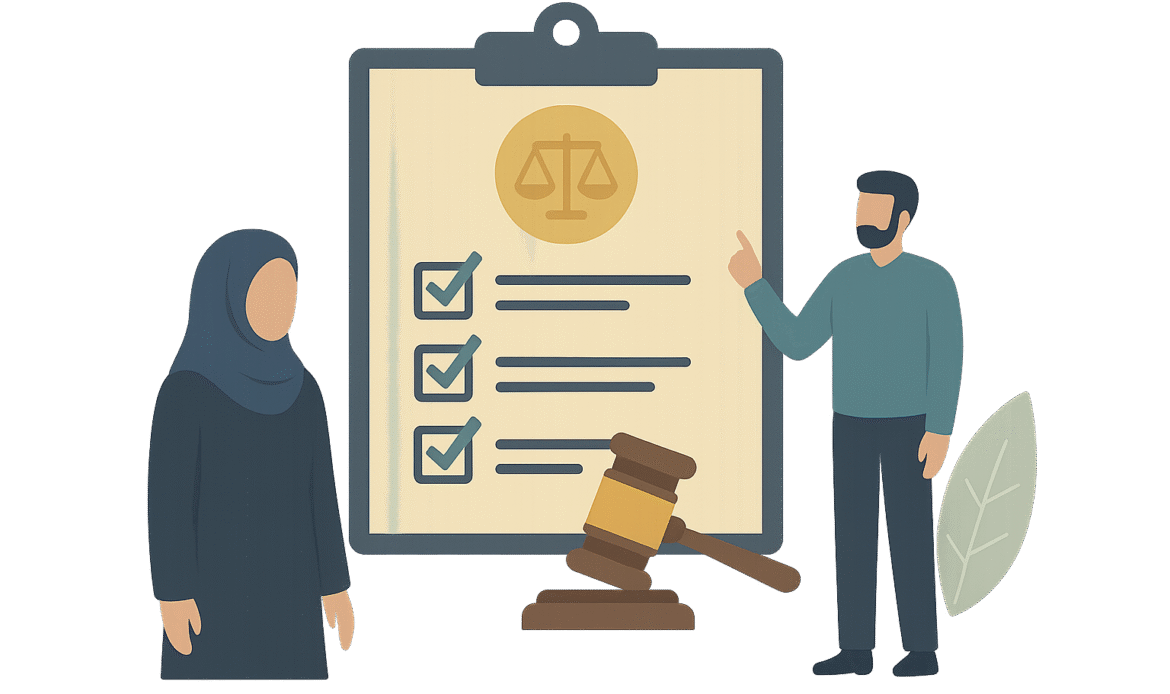Legal Considerations for Islamic Wills Australia
- Go Lawyers
Legal Considerations Guide
Aligning Faith with Law for a Secure and Valid Legacy
When it comes to writing a Muslim will in Australia, understanding the legal considerations is just as important as following religious guidelines. While Islamic law provides a clear framework for inheritance, Australian laws impose specific requirements to ensure a will is valid and enforceable.
Balancing these two systems can be challenging, but it’s essential for Muslims who want their estate plans to honour both their faith and the legal standards of the country they live in.
This guide covers the legal considerations you must be aware of when drafting an Islamic will in Australia. From choosing a qualified executor, identifying rightful heirs, navigating state-specific laws, and avoiding disputes, we outline the practical steps and key challenges.
With the right approach and expert guidance, you can create a will that aligns with your values and stands up in an Australian legal context.
MEETING AUSTRALIAN LEGAL REQUIREMENTS
Islamic wills must comply with state succession laws to be valid, including proper witnessing, capacity, and formal execution.
ALIGNING FIXED SHARES WITH SHARIAH RULES
Islamic inheritance law assigns specific shares to heirs. Legal documents must reflect these shares to remain religiously and legally enforceable.
HANDLING SUPERANNUATION AND NON-ESTATE ASSETS
Super funds and jointly held property require special planning as they may fall outside the Islamic will unless structured correctly.

Understanding the Dual Legal Framework
Balancing Shariah and Australian Law in Estate Planning
Drafting Islamic wills in Australia requires reconciling religious obligations with civil statutes.
Shariah law prescribes specific inheritance rules outlined in the Qur’an, while Australian law mandates procedural elements such as witnessing, testamentary capacity, and asset disclosure. Bridging both systems ensures your will is legally enforceable and religiously sound.
Testamentary Capacity and Legal Validity
One of the foundational legal considerations is testamentary capacity—the legal ability to make a will. The testator must understand the nature of a will, the extent of their estate, and the consequences of their decisions. In Muslim wills, scholars often conduct an additional religious assessment to confirm the testator’s understanding of their obligations under Shariah.
Witnessing Requirements and Execution Formalities
Each Australian state and territory has strict rules about how a will must be signed and witnessed. To be valid, Muslim wills must be signed in the presence of two adult witnesses who are not beneficiaries. Many law firms now include “self-proving affidavits” and video recordings of execution to reduce the risk of disputes and delays in probate.
- let’s navigate your path forward together.
Unsure About Legal Considerations? We’ll Help You Stay Compliant.
Get expert advice on Islamic wills that meet both Australian legal standards and Shariah requirements. Protect your estate with confidence and clarity.
Key Components of an Islamic Will
- Executor: The individual responsible for ensuring the will is carried out according to its terms. This person must be trustworthy and competent to handle the responsibilities of executing the will, including settling debts and distributing assets.
- Beneficiaries: Those who will receive portions of the estate. Under Islamic law, beneficiaries usually include family members such as children, spouses, and parents, each receiving a predefined share as stipulated by Sharia.
- Bequests: Gifts to non-heirs, which must not exceed one-third of the estate. This provision allows the testator to allocate part of their estate to friends, charities, or causes they support, while still ensuring that the majority of the estate is distributed according to Islamic inheritance laws.
- Debts and Obligations: Any outstanding debts or obligations that must be settled before distribution. Settling debts is a critical step in the execution of an Islamic will, as it is a religious obligation to clear any financial responsibilities before distributing the remaining estate.
Legal Framework in Australia
In Australia, wills are governed by state and territory laws. While these laws provide a framework for creating a legally valid will, they also allow individuals the freedom to distribute their estate as they wish, within certain limits. This flexibility is crucial for Muslims who wish to create a will that satisfies both their religious convictions and the legal standards of Australia.
Legal Validity of Wills
To ensure the legal validity of a will in Australia, it must meet the following criteria:
- Written Document: The will must be documented in writing. This ensures there is a tangible record of the testator’s intentions.
- Testator Capacity: The person making the will (the testator) must be of sound mind and at least 18 years of age. This requirement guarantees that the testator is fully aware of their actions and the implications of the will.
- Witnesses: The will must be signed by the testator in the presence of at least two witnesses, who are not beneficiaries. This provision prevents potential conflicts of interest and ensures the will’s integrity.
Reconciling Islamic and Australian Legal Requirements
- Alignment: The will should align with both Islamic principles and Australian legal requirements. This involves understanding the intricacies of both systems and ensuring that they are harmonized in the document.
- Clear Language: Use clear and unambiguous language to avoid disputes. A well-drafted will reduces the likelihood of misunderstandings and ensures that the testator’s intentions are accurately reflected.
- Professional Advice: Seek advice from legal professionals familiar with both Islamic and Australian laws. Engaging experts who understand these dual requirements can help in drafting a will that is both compliant and comprehensive.
Common Challenges
Inheritance Shares
Under Islamic law, specific shares of an estate are allocated to certain family members, such as children, parents, and spouses. This can conflict with Australian laws that prioritize the testator’s wishes. Navigating these differences requires a nuanced understanding of both legal systems to ensure that the will is both fair and compliant.
Bequests
Islamic law allows bequests to non-heirs up to one-third of the estate. This must be carefully managed to comply with both religious guidelines and Australian legal standards. The challenge lies in ensuring that these bequests do not infringe upon the mandatory shares allocated to heirs under Islamic law.
Dispute Resolution
Disputes can arise if the will’s terms are not clearly defined or if beneficiaries feel unfairly treated. Including a dispute resolution clause can mitigate potential conflicts. This clause should outline the steps to be taken in case of a disagreement, possibly involving mediation or arbitration before resorting to legal proceedings.
Practical Steps to Create an Islamic Will in Australia
- Consultation: Begin by consulting with both an Islamic scholar and an Australian legal expert to understand the requirements. These consultations provide valuable insights into the necessary components and potential pitfalls of drafting an Islamic will.
- Drafting the Will: Clearly outline the distribution of assets, considering both Islamic principles and legal obligations. This step is crucial to ensure that the will reflects the testator’s wishes while remaining compliant with both sets of laws.
- Review and Revise: Regularly review and update the will to reflect changes in circumstances or law. Life events such as marriage, childbirth, or the acquisition of new assets can significantly impact the distribution outlined in a will.
- Secure Documentation: Ensure the will is stored securely and accessible to the executor. A well-protected will is less likely to be tampered with and ensures that the executor can easily access it when needed.
The Role of Islamic Scholars
Islamic scholars play a crucial role in ensuring that the will adheres to religious principles. They can provide guidance on the appropriate distribution of assets and address any religious queries. Their involvement can also lend credibility to the will, reassuring beneficiaries that the distribution of the estate is in line with Islamic teachings.
Importance of Regular Updates
Life changes such as marriage, the birth of children, or acquiring new assets can impact the distribution outlined in a will. Regular updates ensure the will remains relevant and effective. Staying informed about changes in both Australian law and Islamic guidelines is essential to maintain the will’s validity and ensure that it fulfills its intended purpose.
Conclusion – Write With Integrity, Secure With Law
Creating an Islamic will in Australia involves balancing religious obligations with legal requirements. By understanding the key components, seeking professional advice, and regularly updating your will, you can ensure that your estate is distributed according to your wishes and in compliance with both Islamic and Australian laws.
Taking these steps will provide peace of mind for you and your loved ones, knowing that your wishes will be honoured and your legacy preserved. This careful planning not only protects your assets but also upholds your values, ensuring that your life’s work is distributed in a manner that reflects your beliefs and provides for those you care about most.
- Expert Mediation Services
Find Resolution, Not Conflict
Disputes don’t have to lead to lengthy court battles. At Go Lawyers, our mediation lawyer services provide a practical and efficient way to resolve conflicts. Our experienced team fosters constructive dialogue to achieve fair and mutually beneficial outcomes, whether it's family mediation, business disputes, or transactional issues.
Let us guide you toward a solution that prioritises your interests while preserving relationships.
- Why Choose Go Lawyers?
Professional Lawyers who offer a fixed, fair price
Whether you are an individual, a business owner, or part of a giant corporation, our experienced team delivers solutions that protect your interests and drive results. From drafting contracts and negotiating agreements to resolving disputes through mediation or litigation, we handle every aspect of your legal needs professionally and carefully.
We understand the importance of clear communication and cost-effective services, so we prioritise transparency and efficiency. Our team possesses expertise in risk management, compliance, and the resolution of commercial disputes, allowing you to depend on us as a reliable partner throughout the entire process.
